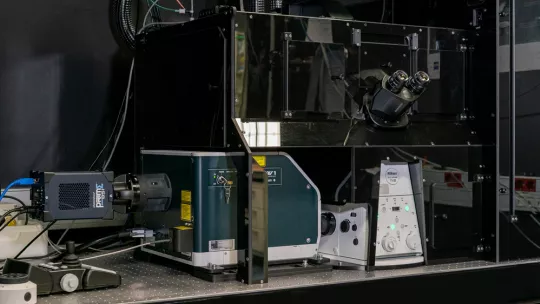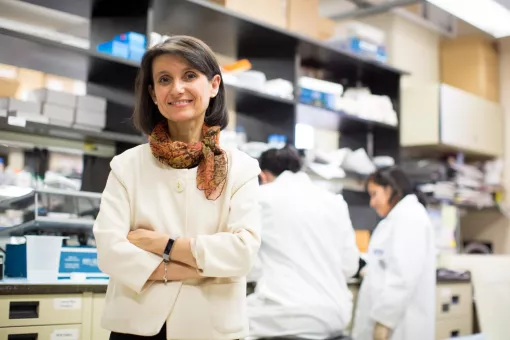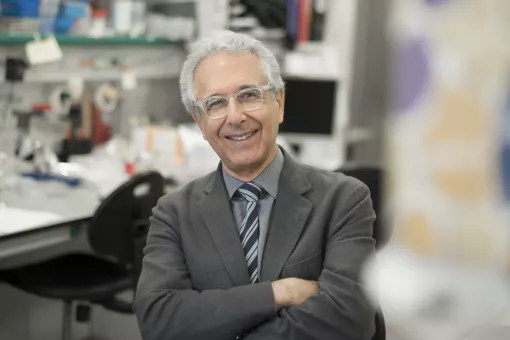Images
This new technology in advanced confocal microscopy is the only one in Spain and it will accelerate the fight against cancer by facilitating innovative research projects on cell plasticity, response to treatment, and relapse.
The Institute for Research in Biomedicine (IRB Barcelona) has acquired a cutting-edge microscope thanks to the support of the BBVA Foundation. The only one of its kind in Spain, this microscope will accelerate cancer research. This advanced confocal microscope has a cell incubator and a robot, allowing long experiments to be performed in an automated manner. This new technology will be used in numerous projects, in particular those addressing cell plasticity, a key process in tumour recurrence after treatment and in the fate of individual cells within a tumour.
“The microscope we have purchased will allow us to launch new lines of research into cancer. For IRB Barcelona, the support of the BBVA Foundations is essential because it allows us to be more competitive as a centre and to tackle more ambitious scientific challenges,” says Dr. Francesc Posas, director of IRB Barcelona.
The BBVA Foundation supports the research conducted at IRB Barcelona by serving on its Board of Trustees, funding research into cancer and metastasis, and promoting science dissemination through outstanding international conferences.
Organoids and the fate of individual tumour cells
Installed in IRB Barcelona’s Advanced Digital Microscopy Facility, which is headed by Julien Colombelli, the microscope will be used to work with organoids: mini-cancers grown in the laboratory that allow the study of cancer cells in a 3D environment that simulates physiological conditions. The goal is to analyse the different types of cancer cells that make up a tumour and their interaction with other cells around it, such as those belonging to the immune system.
Tumours are heterogeneous and are known to be formed by various types of cell that play different roles. Understanding the mechanisms and cells responsible for tumour recurrence after treatment (whether by surgery, radio- or chemo-therapy) or identifying those cells that escape from the tumour, colonize other vital organs and cause metastasis is crucial in the search for new therapies.
Last-generation technology to accelerate research
The new equipment is an inverted, robotic, automated microscope for capturing fluorescent images of living cells cultured in 3D and/or organoids. It can achieve cellular or subcellular resolution with high-performance confocality. Also, this microscope has an integrated robotic incubator to load multiple samples in sequence, thus allowing experiments to be performed simultaneously and accelerating research projects.
“In a conventional microscope, a scientist doing an experiment that lasted 2 weeks would take up the equipment during this time, thus preventing other researchers from using it. With this new equipment, we can have up to 20 people doing experiments during these two weeks and this means that it is 20 times more productive because experiments can be interlaced automatically. So this piece of equipment opens up the possibility of undertaking experiments that were not conceivable before,” says Colombelli.
Collaboration for research of excellence
Fully committed to biomedical research of excellence, the BBVA Foundation has been linked to IRB Barcelona since 2005, when the institute was founded, and has served on its Board of Trustees since 2014. In addition to supporting research projects into cancer and metastasis, since 2005 the BBVA Foundation has promoted 35 international Barcelona BioMed conferences, which are of high scientific impact.
The acquisition of this microscope is part of IRB Barcelona’s commitment to strengthening the capacity to characterize animal models of disease in biomedical research. In addition to the contribution of the BBVA Foundation, this new microscope has been funded by the European Regional Development Fund (ERDF) and by the Institute itself.
About IRB Barcelona
The Institute for Research in Biomedicine (IRB Barcelona) pursues a society free of disease. To this end, it conducts multidisciplinary research of excellence to cure cancer and other diseases linked to ageing. It establishes technology transfer agreements with the pharmaceutical industry and major hospitals to bring research results closer to society, and organises a range of science outreach activities to engage the public in an open dialogue. IRB Barcelona is an international centre that hosts 400 researchers and more than 30 nationalities. Recognised as a Severo Ochoa Centre of Excellence since 2011, IRB Barcelona is a CERCA centre and member of the Barcelona Institute of Science and Technology (BIST).










